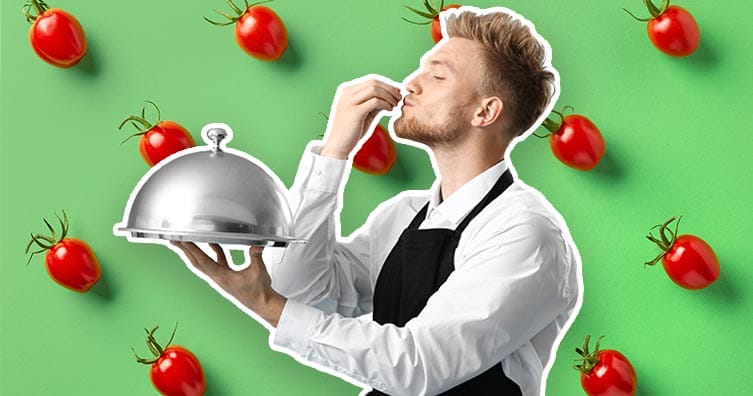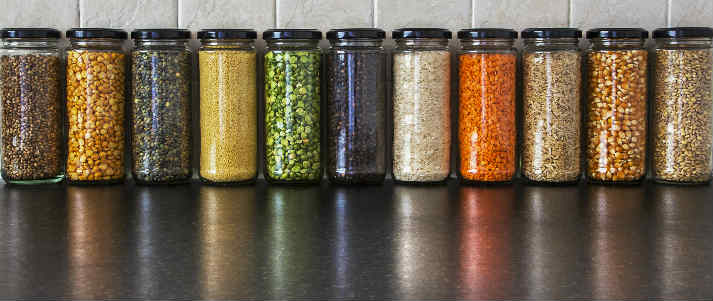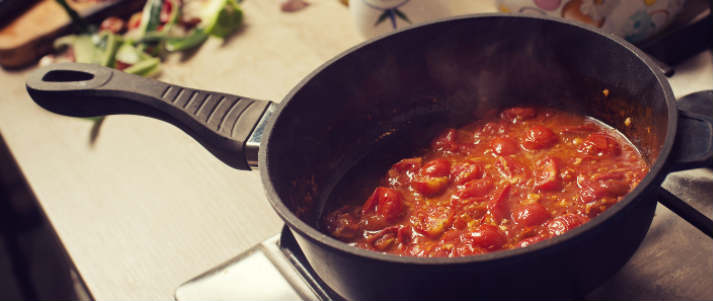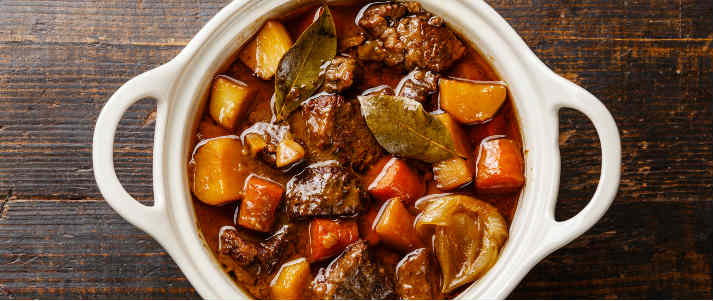11 essential cooking tips for students
Looking to improve your foodie skills? With some simple cooking tips for students, you'll be a culinary pro in no time.

Credit: Pixel-Shot, baibaz – Shutterstock
The thought of suddenly having to make all your own meals can be daunting when you first get to uni. But once you get the hang of things and feel confident in the kitchen, cooking will become much more enjoyable (and cheaper!).
To avoid splashing out on expensive restaurant meals and takeaways, you can save a lot of money. You could also show off your skills by inviting your friends over for dinner parties.
Becoming an expert in the kitchen doesn't happen overnight, it takes a bit of time and patience. Luckily, the student cooking tips and techniques below will help a lot.
Best student cooking tips
Here are the easiest ways to improve your cooking skills:
-
Use more food seasoning

Credit: Ed Samuel – Shutterstock
One of the best and easiest cooking tips for students is to spice things up, literally. Believe us, a good bit of seasoning can transform even the blandest food into something spectacular.
If you embrace the supermarket downshift and start going for 'basics' when doing your weekly food shop, a bit of seasoning can really spice up a cheap can of beans or a pack of noodles.
In the same way that salt and pepper are cupboard essentials, think about which other spices and herbs you like. They can completely change how you cook and eat.
A touch of chilli powder, Cajun pepper or paprika will bring a nice kick to pretty much any meal. On the other hand, dried oregano and basil are great for any Italian pasta dish.
Look into some nice combo spice shakers at your local supermarket too. Garlic salt or chilli, garlic and herb mixes can turn a boring dish into something super tasty.
-
Stock up on basic cupboard supplies
The more cooking you do, the more you'll notice that a lot of recipes use the same base ingredients.
That's why it's a good idea to stock up on these. It's a lot easier to throw together meals if you know you have the majority of the ingredients already in your cupboard. Luckily, we have a full list of student cupboard essentials that will steer you in the right direction.
It might seem like a bit of an expense to shell out on at first, but they will last for years and save you money in the long run.
-
Learn an easy tomato sauce recipe

Credit: KaliAntye – Shutterstock
Learn how to make a simple but amazing tomato sauce and you're sorted! Not only are these great for pasta dishes, but you can also use a base like this to make tasty enchiladas, Spanish-style stews, casseroles, Bolognese, chilli con carne and more.
Everyone has their own way of making tomato sauce using their favourite flavours and spices. Once you have it nailed down, you can add whatever meat and/or veg and serve it up with any other ingredients that you fancy (like couscous, rice, pasta or potatoes).
Aside from its nutritional value, tomato sauce offers a bit of variety if you switch up the ingredients, and it's also cheap to make. It also keeps well in the fridge and tastes great for days afterwards (even when frozen – see point six below).
-
Buy the right kitchen pans
Most people think they'll cook better food if they have a greater assortment of pans, but you really just need two pans. If you can, try to get one good one and one cheap one.
We'd recommend getting a decent quality non-stick frying pan that has a bit of depth to it and a lid.
Aside from soups, you can cook pretty much anything in a pan like this. Non-sticks are also very easy to clean.
The second pan we'd recommend getting is a cheap, deeper pan for the previously mentioned soup cooking. It also helps if you can have two compartments of a meal cooking at the same time.
If you haven't already, check out the top kitchen gadgets to step up your cooking game. -
Use a microwave more
Microwaves are underrated. If you know what you're doing, your microwave can become a trusty ally in producing a top-class meal.
Admittedly the microwave is never going to be as good as hobs or an oven at making quality food. But it does require a lot less effort to use and leads to a lot less washing up.
Our list of foods you didn't know you could cook in the microwave is full of hidden gems, ranging from poppadoms to salmon to caramel sauce.
-
Start freezing food
One of the biggest kitchen controversies you're likely to encounter as a student is the battle over freezer space. Freezing food can make it last much longer, so it helps a lot if you do have a big enough freezer to share with your flatmates.
A trick is to opt for freezer bags instead of boxes as they take up less room. You can even go as far as scooping single portions of soups, sauces or whatever else into individual bags. Then, defrost them as and when you need them.
There are loads of things you can freeze that you probably didn't realise you could.
-
Try one-pot recipes

Credit: Lisovskaya Natalia – Shutterstock
We're massive fans of one-pot dinners. They're easy to cook and can be divided into different portions to be eaten throughout the week. One-pot meals also tend to be cheap to make and involve minimal washing up.
Our simple soup recipes will get you started. Or, if you've got a slow cooker, you could try our tasty pulled pork recipe.
-
Cook with vegetarian mince
If you're yet to try vegetarian alternatives to meat like Quorn, we can confirm they're great.
The most popular Quorn product is probably the mince. Aside from having a much lower fat content and almost as much protein as regular mince, it's also much cheaper. What's more, you can keep it in the freezer for months.
As for the taste? Most mince recipes involve a sauce of some kind. Both meat and Quorn end up absorbing the flavour of that anyway.
Although the texture of Quorn is slightly different to meat, you'll struggle to notice any real difference if you're using it in dishes like spaghetti Bolognese or chilli con carne.
If you're not a mince fan, you can also find meat-free burgers, chicken, sausages and more at the supermarket. They're generally low in fat, high in protein, and better for the environment (and your wallet) than standard meat products.
-
Learn cooking skills from friends and family
Cooking with friends and flatmates is a great way to improve your skills in the kitchen. You may not be a fan of all of their cooking techniques, but seeing how other people cook and prepare food is excellent practice and will expand your culinary knowledge.
Remember that your way isn't necessarily the right way in the kitchen. People can get quite defensive when their kitchen techniques are questioned, so try to be open-minded. You never know, it might be nice to try a new onion-chopping method.
Taking turns cooking for each other in your student house is also good fun. You can even ask for recipes of the dishes you like to help grow your own foodie repertoire.
-
Go food shopping with friends
Whether or not to go food shopping with friends is a personal choice. Some prefer to shop alone so they don't get distracted by other people's purchases, which is completely understandable.
But the benefit of shopping with someone else is that you can often save money by buying in bulk. So, if you're both planning to buy pasta, for example, you could save money by getting a big pack and sharing it.
Or, if you see any multi-buy deals at the supermarket, it can be a great money-saver if you have someone to split the offer with.
However, bear in mind that sometimes supermarkets are sneaky and make it seem like you're getting a good deal when you're not actually saving any money. Make sure you know what to look out for, and always do the maths before parting with your cash.
-
Get to grips with meal planning
Planning your meals ahead will save you a lot of money, and can be a lot healthier, as it helps you avoid the temptation of buying food while you're out or getting a takeaway.
Deciding on your meals for the week means you'll only buy exactly what you need from the supermarket. The same applies to lunches. It's best to make sure you have enough of everything to last you the week, or life will get in the way and you'll find yourself in KFC at lunch to save time.
Homemade dishes shouldn't be boring. In fact, you could use your cooking skills to recreate your favourite restaurant meals at home for half the price.
Alternatively, you can use our full meal plan.
Check out our top tips for saving money on food.








